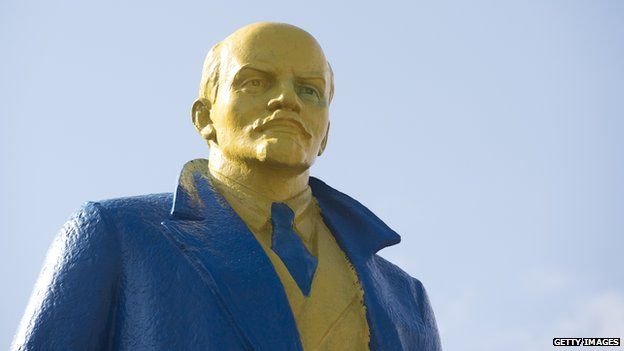Goodbye, Lenin: Ukraine moves to ban communist symbols
- Published

Ukraine's parliament has banned communist symbols, but what does this mean for a country where every other town has a street named after Lenin?
Lenin Avenue runs like a spine through Zaporizhya, a major city in Ukraine's industrial heartland. At the top of the avenue is Lenin Square, adorned by a giant statue of the Russian revolutionary leader himself.
He points towards a hydropower dam, which bears his name and also has a huge bas relief depicting an Order of Lenin on one of its walls.
Behind the dam is Lake Lenin with Lenin Island in the middle, and all of this is located in the city's Lenin District.
Totalitarian past
This is the kind of legacy Ukraine's legislators are trying to get rid of.
On 9 April, they passed a bill banning communist propaganda as well as Nazi symbols. The ban applies to monuments, place and street names, which will have to go within six months once the president signs it into law.
Hundreds of statues will have to be removed, millions of street signs replaced and tons of paperwork processed. Clearly this will be an expensive exercise that Ukraine may struggle to afford at a time of war, but supporters argue it is a price worth paying for Ukraine to break with its totalitarian past.
"The issue of renaming was a serious destabilising factor, and by making this decision parliament has removed this factor from our level," Zaporizhya's mayor, Oleksandr Sin, told the BBC.
Critics, however, argue that the ban will worsen the sharp political differences within Ukraine.
"Laws like this only add to the tensions. They aren't what our society needs," political expert Kost Bondarenko told Segodnya, a Kiev-based daily.
After Ukraine gained independence in 1991, many communist names were removed from its map by local councils.
Later, the ousting of President Viktor Yanukovych and the subsequent rise in Russia-backed militancy in the east triggered a wave of attacks on statues of Lenin across the country. They were toppled by activists angry at what they saw as the Kremlin's meddling in Ukraine.
But the Soviet legacy lingers, particularly in eastern parts of the country.
Several towns and cities may even have to change their names because of the new law.
Among them is Dnipropetrovsk, which lies about an hour's drive north of Zaporizhya and is partly named after Grigory Petrovsky, a Communist revolutionary and functionary.
Vadym Shebanov, a senior official at the Dnipropetrovsk city council, told the BBC that a commission was already being set up to choose a new name.
Reverting to the city's previous name will hardly work. Until 1926, it was called Ekaterinoslav in honour of Ekaterina (or Catherine) the Great, the 18th-Century Russian ruler who dismantled the Cossack movement, an important pillar of Ukraine's national identity.
The commission will also draw up a list of streets to be renamed. "Many still bear the names of people who tried to obliterate the Ukrainian nation," Mr Shebanov said.
Predictably, the Ukrainian parliament's move to ban communist symbols outraged Russia. Its foreign ministry called the move "sacrilege" and said officials in Kiev had "a perverse idea of good and evil".
"The country's leaders have declared war on their own past by banning communist symbols and turning Hitler's accomplices into heroes," state-run Rossiya-1 TV said at the top of its prime-time news bulletin on 9 April. It made no mention that the Ukrainian parliament had banned Nazi symbols, too.
Russia itself is no stranger to anti-communist measures.
It banned the Soviet Communist Party after the failed coup attempt against reformist President Mikhail Gorbachev in 1991.
The names of many Russian cities reverted to what they were before the 1917 Bolshevik revolution: Leningrad became St Petersburg, Sverdlovsk became Yekaterinburg and Gorky became Nizhny Novgorod.
After the Soviet Union collapsed, many of its former republics and allies banned communist symbols, too.
In Poland, anyone convicted of disseminating them may face a jail term of up to two years. Georgia also removed communist street and place names and outlawed Soviet symbols. Similar bans are in place in Latvia and Lithuania.
Ukraine's journey away from its communist past will be long and arduous, but commentators within the country are hopeful. "Our ship has left the communist harbour," analytical daily Den said. "Fair seas and a following wind!"
BBC Monitoring reports and analyses news from TV, radio, web and print media around the world. For more reports from BBC Monitoring, click here. You can follow BBC Monitoring on Twitter and Facebook.
- Published9 March 2015
- Published16 March 2015
- Published21 June 2023